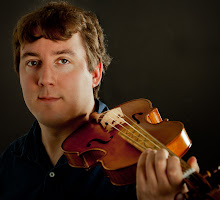Life in Bloomington has so far been pretty awesome. I have made some bad-ass friends, and am playing some bad-ass music. The decision to switch to early music has definitely been the right one - I am now amongst people who actually think about music (my God, what is the world coming to?). Of course, this is a bit over the top, as there are truly great musicians and awful musicians in both the fields of modern music and early music, but I think it is generally true that most modern musicians think it sufficient to play music from a technical or sonic standpoint (if it's in tune and with a beautiful sound, it's good enough, thank you very much), whereas in the world of early music, that's just a given, and merely a foundation for the imagination and rhetoric that comes next. I remember playing in a full-time symphony orchestra, with a conductor who was trying to do creative things with colour and to get the musicians to think in terms of character. At the orchestra break, a fellow violinist came up to me and said cynically "Faster, slower, louder, softer, that's all he needs to tell us."
I guess you have to have a balance of accuracy and imagination. One can have all the character, flair and imagination in the world, but if it's not in tune or rhythmically secure, then no one will even hear or care about what you're doing with the music. But if you lose yourself focusing on the technical aspects, then the performance comes across as accurate but boring. If you're hearing a great performance, you are minimally aware of the technical aspects of the music - the spirit and affect come across so strongly and you're captivated by every note. Two individual performers who I think do this so well are Andrew Manze and Cecilia Bartoli.
Early music, though, has of course long been affected by the technical, historically authentic aspects of music, and has resulted in many-a-boring, bland and unimaginative performance or recording. But that kind of playing is happily being superseded by much more exciting and moving performances and recordings nowadays.
I'm starting to waffle. Speaking of which...breakfast!

No comments:
Post a Comment